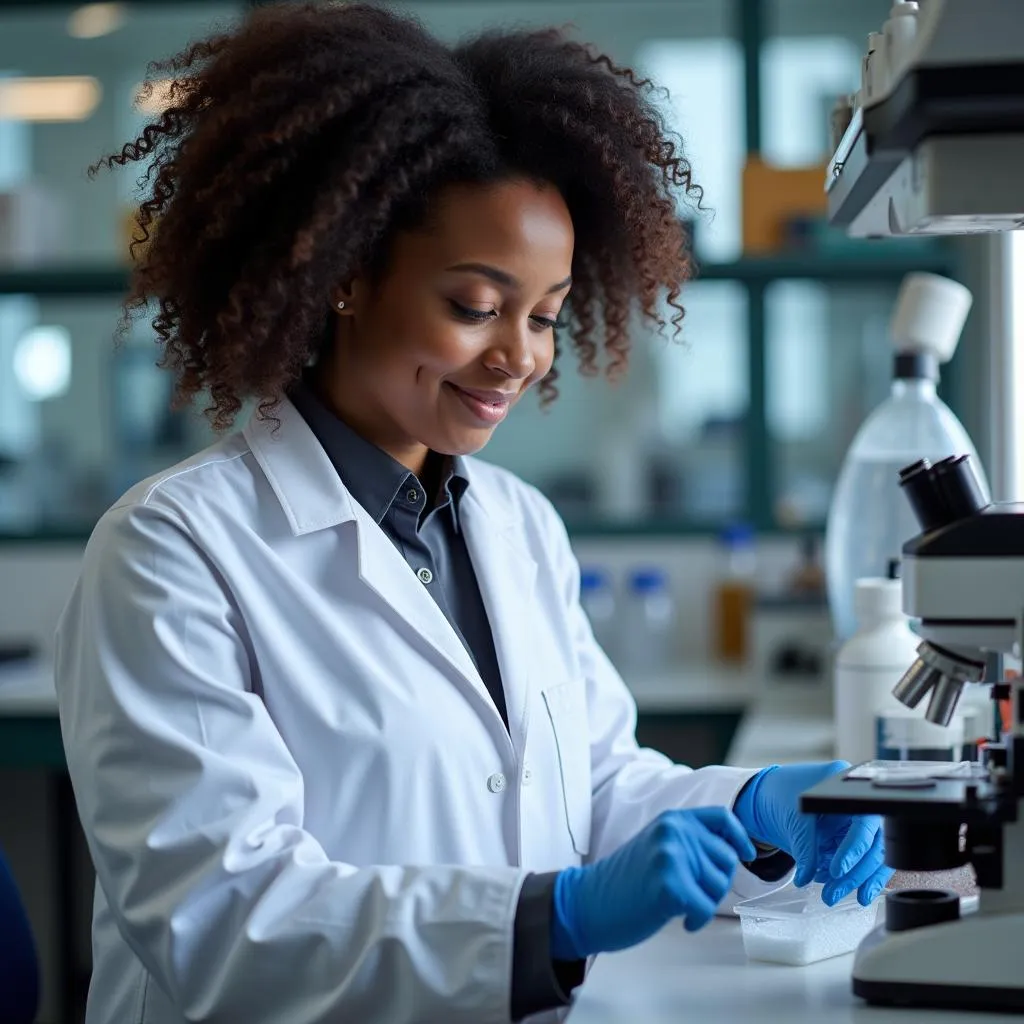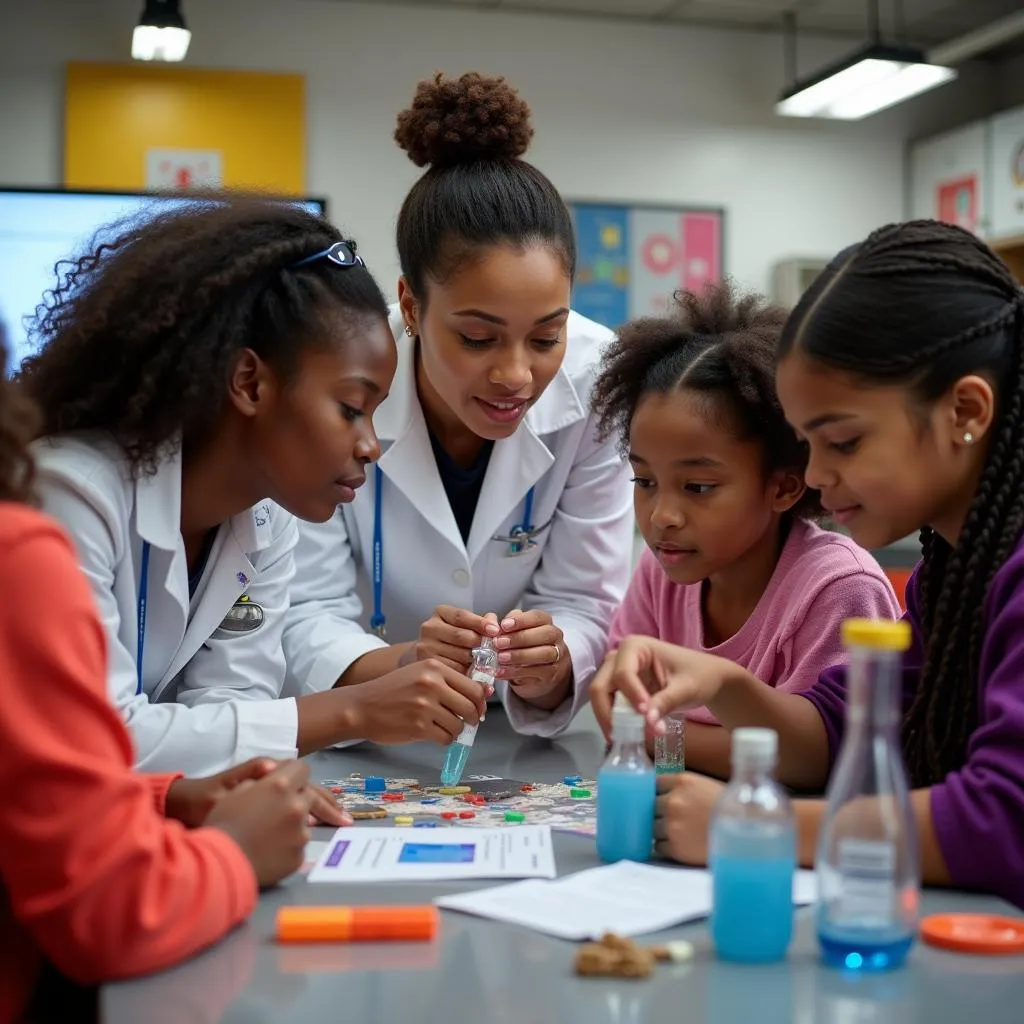Shining a Light on African American Female Scientists
Throughout history, African American women have made significant contributions to science, technology, engineering, and mathematics (STEM) fields, despite facing significant barriers and systemic racism. These remarkable women have overcome adversity and shattered glass ceilings to pursue their passions and make groundbreaking discoveries that have advanced our understanding of the world. This article celebrates the achievements of African American Female Scientists and highlights their inspiring journeys.
 African American Female Scientist in Lab
African American Female Scientist in Lab
Early Pioneers Paving the Way
The story of African American women in science begins with pioneers who challenged societal norms and fought for access to education and opportunities. One such trailblazer was Dr. Ruth Ella Moore (1903-1994), a renowned bacteriologist who became the first African American woman to earn a Ph.D. in a natural science. Her groundbreaking research on the tuberculosis bacterium significantly contributed to the development of effective treatments for the disease.
Another pioneering figure was Dr. Marie Maynard Daly (1921-2003), the first African American woman to receive a Ph.D. in chemistry in the United States. Dr. Daly’s groundbreaking research focused on the composition of DNA and the protein synthesis within the cell nucleus. Her work laid the foundation for our understanding of the genetic code and the mechanisms of heredity.
These early pioneers not only made groundbreaking scientific discoveries but also paved the way for future generations of African American women to pursue careers in STEM.
 African American Female Scientist Mentoring Young Girls
African American Female Scientist Mentoring Young Girls
Overcoming Barriers and Breaking Barriers
Despite the achievements of these early pioneers, African American women continue to face significant challenges in STEM fields. These challenges include limited access to quality education, lack of mentorship opportunities, and systemic racism within academic institutions and professional organizations.
However, despite these obstacles, African American female scientists have persevered and achieved remarkable success. They have formed support networks, mentored younger generations, and advocated for greater diversity and inclusion in STEM. Their resilience and determination serve as an inspiration to aspiring scientists from all backgrounds.
Notable Figures and Contemporary Contributions
The legacy of African American female scientists extends far beyond the early pioneers. Today, countless brilliant women continue to make significant contributions across various scientific disciplines.
Dr. Mae Jemison became the first African American woman to travel to space in 1992, inspiring generations with her courage and determination. Dr. Shirley Ann Jackson, a theoretical physicist, became the first African American woman to lead a top-ranked research university when she was appointed president of Rensselaer Polytechnic Institute.
In the field of medicine, Dr. Alexa Canady distinguished herself as the first African American woman to become a neurosurgeon, performing groundbreaking work on pediatric neurosurgery. Dr. Marilyn Hughes Gaston has dedicated her career to addressing health disparities affecting African Americans, particularly sickle cell disease.
The Future of STEM is Diverse
The contributions of African American female scientists highlight the importance of diversity and inclusion in STEM fields. By fostering an environment where individuals from all backgrounds feel supported and empowered to pursue their scientific passions, we can unlock a wealth of untapped potential and drive innovation for the benefit of all.
Supporting organizations that promote STEM education for underrepresented groups, advocating for equitable access to resources and opportunities, and celebrating the achievements of marginalized scientists are crucial steps towards creating a more inclusive and equitable scientific community. As we look to the future, it is essential to continue shining a light on the incredible achievements of African American female scientists and pave the way for future generations to follow in their footsteps.
Frequently Asked Questions (FAQ)
1. Who was the first African American woman to earn a Ph.D. in a natural science?
The first African American woman to earn a Ph.D. in a natural science was Dr. Ruth Ella Moore, a distinguished bacteriologist.
2. What are some of the challenges faced by African American women in STEM?
African American women in STEM often face challenges such as limited access to quality education, lack of mentorship, and systemic racism within academic institutions.
3. How can I support African American women pursuing careers in STEM?
You can support African American women in STEM by supporting organizations that promote STEM education for underrepresented groups, advocating for equitable access to resources, and celebrating their achievements.
Need More Information?
Explore more inspiring stories of African darter and learn about the accomplishments of African American female celebrities who are making a difference.
Contact Us
For any assistance or inquiries, please contact us at:
Phone Number: +255768904061
Email: kaka.mag@gmail.com
Address: Mbarali DC Mawindi, Kangaga, Tanzania.
Our dedicated customer support team is available 24/7 to assist you.


